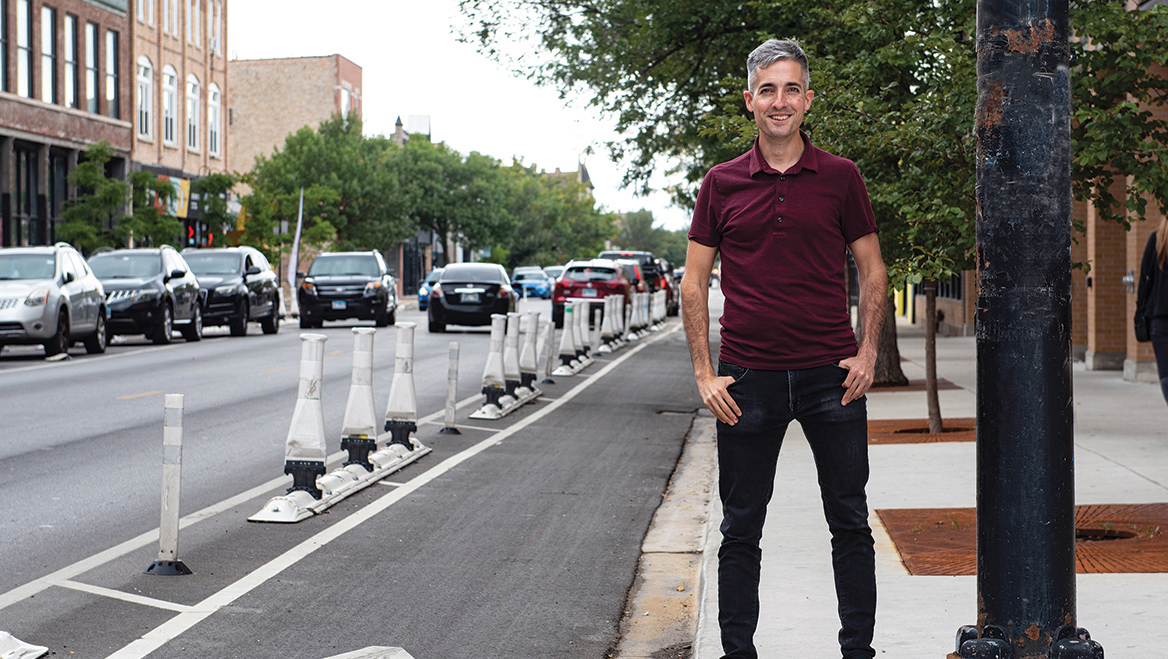Oct. 27, 2022
A 2019 analysis by the New York Times explores the paths members of Congress took on their way to the House or Senate. It looks at education, professional history, and military service, among other things.
While not one of the most common backgrounds (law and business), planning offers a vast and vital skill set to every level of government.
I interviewed five planners-turned-politicians to understand how their planning knowledge helps them solve their constinuents' most pressing challenges. Get a preview below, then click through to the full profiles for more.

Raman motivated Angelenos in her first election through inclusive community engagement — and received a record number of votes. Photograph by Shayan Asgharnia/AUGUST.
Nithya Raman on the Housing Crisis
Los Angeles Council Member, Fourth District
"My planning education has made me attuned to how history impacts our current moment. The prescription for what ails us as a city is thinking of how to undo historical decisions around a lack of affordable housing — my planning education has taught me to look at that history very closely.
A lot of people responding to the crisis of homelessness focus on getting people indoors. And we're doing that, too. Be we didn't get here by accident. Unless we get to the root causes for why we're facing housing insecurity in Los Angeles, we won't be able to solve the problem."
Read the full interview and listen to her episode of the "People Behind the Plans" podcast.

An avid cyclist, Alderman Daniel La Spata advocates for safe, sustainable transportation options throughout Chicago. Photo by Anne Evans/Active Transportation Alliance.
Daniel La Spata on Development and Displacement
Chicago Alderman, First Ward
"My district is facing challenges — but in the best sense of the word. We're seeing lots of development interest and energy coming toward this area. There's commercial energy for new development, but a desire to keep longtime businesses; there's residential energy for new homes, but interest in preservation and affordability, too.
We're trying to find a way to channel all of that in a way that's equitable. That's the real challenge. The most immediate thing I hear from residents is, 'Will I be able to remain in my community long-term?' I'd argue that Chicago has never had more tools at its disposal to address this, but we still struggle with their implementation."

Senator Bobby Powell asks a question about a bill during a legislative session in Tallahassee, Florida. AP Photo by Steve Cannon.
Bobby Powell, AICP, on Community Engagement
Florida State Senator, Thirtieth District, Minority Leader Pro Tempore
"I think the planning focus on community engagement and public participation helps what I do. We have to create better opportunities for residents to participate in the public process.
Lots of people don't know anything about the street widening in their neighborhood until they see the steamroller. We owe it to those residents to get their voices heard at the beginning of the conversation, not the end."

In 2020, Council Member Stark was named one of Phoenix's exceptional women by the Phoenix Arts & Culture and Women's Commissions. Photo by Claudia Johnstone/dasfotohaus.com.
Debra Stark, FAICP, on the Growing Need for Zoning Reform
Phoenix Council member, Third District
"In Arizona, we have a lot of Californians moving here, and they have more money to play with. It's pushed the market upward. Regulations are making building difficult. We have to find ways to make housing easier to build. I think we can improve our zoning ordinance and our regulations to address affordable housing."

Henry Cisneros in his office in San Antonio. Photo by Lisa Krantz/San Antonio Express-News via ZUMA Press.
Henry Cisneros on Life After Office
Former San Antonio Mayor, Former Secretary of the U.S. Department of Housing and Urban Development
"Since leaving public life, I've become chairman of an effort to dramatically revitalize San Antonio's West Side. We buy properties and refurbish them and work to attract industries and jobs to the area. We take our inspiration from Tulsa's Black Wall Street, to create a thriving minority-oriented business district. That's what I do at the local level.
I'm also chairman of a group called American Triple I. We work on transportation and other infrastructure projects nationwide. I want to carry forth my commitment to the nation's infrastructure because cities are the engine of the American economy. As goes metropolitan America, so goes the nation. We need to be investing in the mechanisms that allow that economic engine to function."




